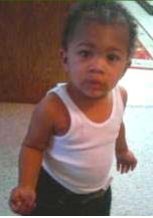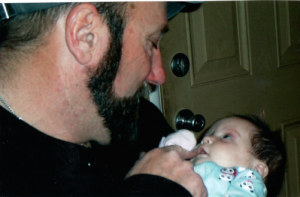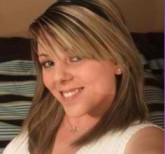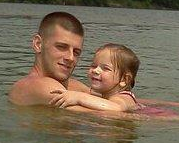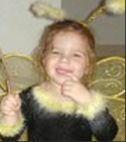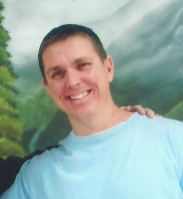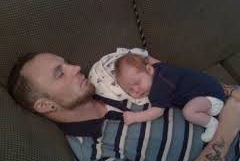The innocent verdict in Yolo County last month has me reflecting on a few of the people I know who are in prison on the basis of medical opinion that (1) short pediatric falls are seldom if ever fatal and (2) the symptoms of a serious infant head injury will be immediately obvious.
Because the doctors are so sure, police and social services move ahead with confidence, and juries tend to convict. Tragically and exasperatingly, the legal outcomes then seem to support the common knowledge, which remains a matter of opinion, not proven fact.
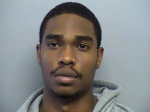
Rico Green
Rico Green
Rico Green in Oklahoma, for example, is serving a life sentence following the 2010 death of his girl friend’s toddler, 13-month-old Gericho. “Anybody that knows Rico knows that’s not him,” says Antoine Hubbard, a family friend who has pulled together the case records, hoping to file an appeal. “Rico’s a gentle guy. He’d never do something like that.”
Gericho’s mother had just started a new job and Rico was watching Gericho, as he often did. He called 911 mid-day, with a report that the boy was unconscious after falling down a few steps—but at the hospital, doctors said a short fall couldn’t account for the injuries.
During extensive police interviews, Rico reported an incident earlier that morning when he had “snatched up” Gericho and scolded him, when the boy had grabbed the toilet plunger after his bath and pretended he was going to bite it, a game he’d learned was provocative. In the videotaped portion of the interrogation, the final half hour, the detectives do most of the talking, insisting that Rico, enraged, shook the boy at that time.
Rico shows a remarkably even temper on camera, seemingly more puzzled than angry as the detectives refuse to accept the story he repeats again and again: What he feels bad about is yelling at Gericho and making him cry. “I know he’s a one-year-old,” Rico explains, “He probably doesn’t understand.” The detectives keep at it, though, until Rico finally seems to accept their theory that he was so angry during the plunger incident he didn’t realize how hard he had shaken the boy when he grabbed him. What sounded like a confession to them looked to me like acquiescence, and not the behavior of a man prone to violent outbursts.
Rico’s trial lasted three days and featured 13 prosecution witnesses. The public defender called no witnesses on his behalf, and the jury convicted Rico of murder in the first degree. Antoine Hubbard is now looking for pro bono legal help.
Jeff Baker
In Idaho, mature father Jeff Baker is serving a life sentence for the death of his daughter Gracelynn, not quite three months old the afternoon in 2010 when her father found her struggling to breathe shortly after he’d fed her. The babysitter who had been caring for the girl earlier in the day later told police she had accidentally dropped the baby into a sink while bathing her, but Baker was convicted of murder, in what doctors testified was both a shaking and a slamming assault.
Pediatric neuroradiologist Dr. Patrick Barnes, called in by the defense, noted that Gracelynn’s breathing tube was misplaced in two of the scans he reviewed. Baker, who has written his own appeal from prison, sent me excerpts from the medical records showing the catastrophic drop in his daughter’s blood-oxygen levels that night, and the “reintubation” procedure the following morning. The state has appointed an attorney to represent Baker at the upcoming hearing on his appeal.
Tiffani Calise
Tiffani Calise was only 19 years old the night she called 911 for help with a toddler who she said had slipped and fallen in the bathtub. She was arrested two weeks later, in August of 2010, and she hasn’t been out of custody since. She is now missing her own daughter’s childhood while serving a sentence of 15 years to life for the presumed murder of her friend’s child. Her first appeal was turned down, but supporters are working on another.
Leo Ackley
Last year’s successful appeal on behalf of Leo Ackley turned to disappointment this spring, when the Michigan Court of Appeals reversed that decision, calling it “clear error.”
At issue was whether trial counsel Kenneth Marks provided ineffective assistance in 2012 by failing to look for a different expert witness after the first pathologist he approached, Dr. Brian Hunter, told him he believed 3-year-old Baylee’s injuries were caused by abuse, not the fall from a bed that Ackley had reported. In hearings last summer, Hunter testified that he told Marks the issue was controversial, and he suggested other pathologists who believed a short fall could be fatal. He did not charge for the initial consultation.
Marks concedes that he did not contact either of the experts Hunter had suggested, but chose to spend the $1,500 he’d been granted to hire Hunter, not as an expert witness but as a trial consultant, preparing him to cross examine the state’s pathologist. All parties seem to agree that Marks successfully forced Dr. Joyce deJong to admit on the stand that doctors did not know what level of force was necessary to cause the brain injury that killed Baylee. Still, Ackley was convicted of murder and sentenced to life in prison.
Appeal attorney Andrew Rodenhouse argued that because the case hinged on expert medical opinion, a reasonable defense required a physician on the stand to support Ackley’s claim of innocence. Marks should have contacted one of the suggested experts, Rodenhouse said, petitioning the court for more funds if necessary, or he could have at least subpoenaed the little girl’s pediatrician, who had noted at a check-up that Baylee was doing better with the mother’s new boyfriend in her life. In the fall of 2013, Chief Circuit Judge James C. Kingsley agreed and set aside Ackley’s conviction.
In an opinion released in April, though, a new panel of judges concluded:
“[Marks’] decision not to consult a second expert constituted trial strategy. Defense counsel is not required to continue seeking experts until he finds one who will offer favorable testimony.”
Rodenhouse says he is entirely committed to both Ackley’s case and the larger fight against misguided accusations of infant shaking. He points to the re-opening of the Adrian Thomas conviction in New York and last week’s remarkable reversal by a Minnesota trial judge of a jury decision and declares, “There is a momentum. We’ve got to keep it going.”
Sean O’Geary
The Innocence Project of Iowa, meanwhile, has confirmed that it’s examining the case of Sean O’Geary, in prison since 1998 in the death of his girl friend’s 2-year-old daughter Mercedes.
The girl’s grandmother had dropped her off on Friday afternoon with a report that she’d had the flu for a couple of days. Both Sean and his girl friend said Mercedes fell onto the coffee table the next day, while jumping on the couch, and both of them reported hearing a loud thump later that night, after everyone was in bed. It was Sean who went to check on her, though, and so it was Sean who was accused of shaking and slamming her to death. He said he found her climbing back into her crib, and she seemed fine at the time, but on Sunday evening she was rushed to the hospital with convulsions.
Michael Giovo Jr.
Without realizing it, Michael Giovo Jr. offered investigators one of the leading stories that child abuse professionals are trained to doubt: A fall from a couch.
Michael said he had stayed up watching television on Thanksgiving night in 2008, after his girl friend had gone to bed. When he heard 4-month-old Skyler crying, he picked him up from his crib and settled him on the couch while heating a bottle. Michael did not witness the fall, he said, but heard a cry and returned to find Skyler on the floor. The boy seemed to recover and spent the night in bed with him, Michael reported, but he and his girl friend rushed the boy to the hospital the next day, when he started twitching. Giovo is now serving life in prison.
Reporter Jonathan Able at the Tampa Bay Times said that Michael had no idea during hours of police questioning that he was accused of assaulting his son:
He said he went along with the interview voluntarily because police said he was not a suspect. “If I knew they were going to make me a suspect I would have asked for a lawyer right then.”
The 2010 conference sponsored by the National Center on Shaken Baby Syndrome featured a mock trial in which a babysitter reported an unwitnessed fall from a bed, a distance of 36 inches, possibly with an impact against a wooden stool. The imaginary infant had both new and old fractures, as well as acute subdural hematoma, retinal hemorrhages, and brain swelling. On the mock stand, the prosecution doctors all agreed that a short fall would not account for the injuries, and that the child had been violently assaulted after she was dropped off at the babysitter’s, the last point at which she was observed to be alert, eating, and playing.
Hundreds of doctors attended that conference and returned to their hospitals with a clear message: Short falls don’t kill. The problem is that it’s a question of faith, not a question of scientific fact. Despite the common knowledge, biomechanical research has shown that short falls can produce large forces. In a report submitted on behalf of death-row inmate Jeffrey Havard in the fall of 2013, for example, biomechanical engineer Prof. Chris Van Ee wrote, “it is clear that low level falls of even 2-3 feet can result in injurious level head impacts resulting in skull fracture and intracranial hemorrhage.”
I wish the doctors who rely so readily on the common knowledge, and the police and social workers who leap into action at the word of the doctors, would slow down and listen to the defendants more carefully. I think there is still a lot to learn.
If you are not familiar with the debate surrounding shaken baby syndrome, please see the home page of this blog.
For more stories of caregivers and parents convicted in short-fall cases, please see http://www.marshamills.org/thestory.aspx, http://brianpeixoto.com/,http://www.freeamandabrumfield.com/, and http://www.theamandatruthproject.com/heartofthematter.htm, and these are only the ones with web sites.
copyright 2014, Sue Luttner

